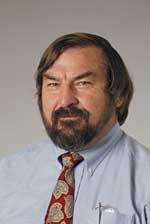Vital Signs:
Investigator Insight
In this section, we highlight the human side of biomedical investigation, putting a few questions to a researcher at DMS-DHMC.
Bill Roebuck, Ph.D.
Professor of Pharmacology and Toxicology and Adjunct Professor of Environmental Studies

Roebuck joined the faculty in 1979 after completing a four-year research fellowship at DMS. He studies the role of aflatoxin in causing liver cancer and teaches medical students as well as an undergraduate course on global public health.
How did you decide to become a scientist?
I did not decide to become a scientist, rather it just happened. In college, I enjoyed chemistry and biochemistry and was very interested in agricultural issues. In the late 1960s and early 1970s, the so-called green revolution was in full tilt. It looked as if hunger might really be eliminated from the world. In graduate school, opportunities opened to combine these interests with the field of toxicology and to contribute to public health.
What advice would you offer to someone contemplating going into your field?
Learn as much chemistry and biology as possible. Find an area in which you can become an expert, and then work very hard at becoming a generalist.
If you weren't a scientist, what would you like to be?
Engaging in this fantasy today, I should love to be a teacher in some small village somewhere off the beaten path—oh, perhaps in the Canadian Arctic. Engaging in this fantasy on another day, I might wish to be a photographer collecting images of less-traveled lands.
What's your favorite nonwork activity?
Without a doubt sea kayaking. My favorite destination is the Arctic, especially Hudson Bay.
What's the last book you read?
Sweet Thursday by John Steinbeck.
What kind of music do you enjoy?
I don't listen to much music, but lately I've been listening to the Johnny Clegg Band, a South African group.
If you could travel someplace you've never been, where would it be and why?
Greenland would be one location. The coastal lands are lush with vegetation, the sea is full of life, and there is a big sky—one is not hemmed in by tall trees. Nature is mostly in control, and humans have to adapt to the ways of nature.
What are the greatest frustration and the greatest joy in your work?
The greatest joy is easy—having a manuscript accepted for publication, followed by seeing it in print. The frustration is the slow pace at which quality experiments can be completed.
Do people have misconceptions about your field?
Toxicology is the study of the adverse consequences to an organism that has been exposed to a particular chemical or chemicals. It is very hard for people to understand that it is the dose, or amount of chemical to which one is exposed, that determines if a toxic event occurs. The dose is the difference between a drug and a poison, or a chemical with no adverse effect and a terrible toxin. We all understand this from chemical relationships of which we have personal knowledge— such as coffee and the jitters. But it's not common for people to use this principle in expecting adverse chemical actions for the wide range of substances—such as drugs, pollutants, and natural toxins—to which we are exposed.
Do you always have a working hypothesis in the lab?
Yes, I do. Sometimes the hypothesis is finely developed and carefully constructed and at other times it is much more general. It is the expectation of an experiment that is critical for me. However, I try not to become too attached to any particular hypothesis such that I cannot reject it or make a new or modified hypothesis.
If you would like to offer any feedback about this article, we would welcome getting your comments at DartMed@Dartmouth.edu.
